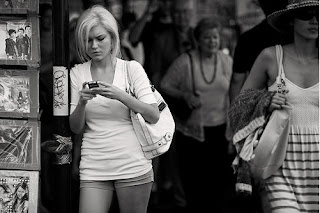Our Media Studies class has been working on a
class video. The video is basically a parody of “The Walking Dead”. Instead of
having Walkers, we have texters.
A short summary of the story:
There’s
a mass text virus going around the school that turns people into zombies when
they read it. A group of friends is trying to run away from these zombies and
not get turned.
We’ve put a lot of work and time into this video
already and it’s only just started getting filmed, so it should be pretty good!
One way
we can probably all relate to this video is that we’ve all either ran into or
been that person with their eyes glued to their phone while walking through the
halls. People can be obsessed with their phones and act a little zombieish so
it’s fun to do a parody sowing that.











